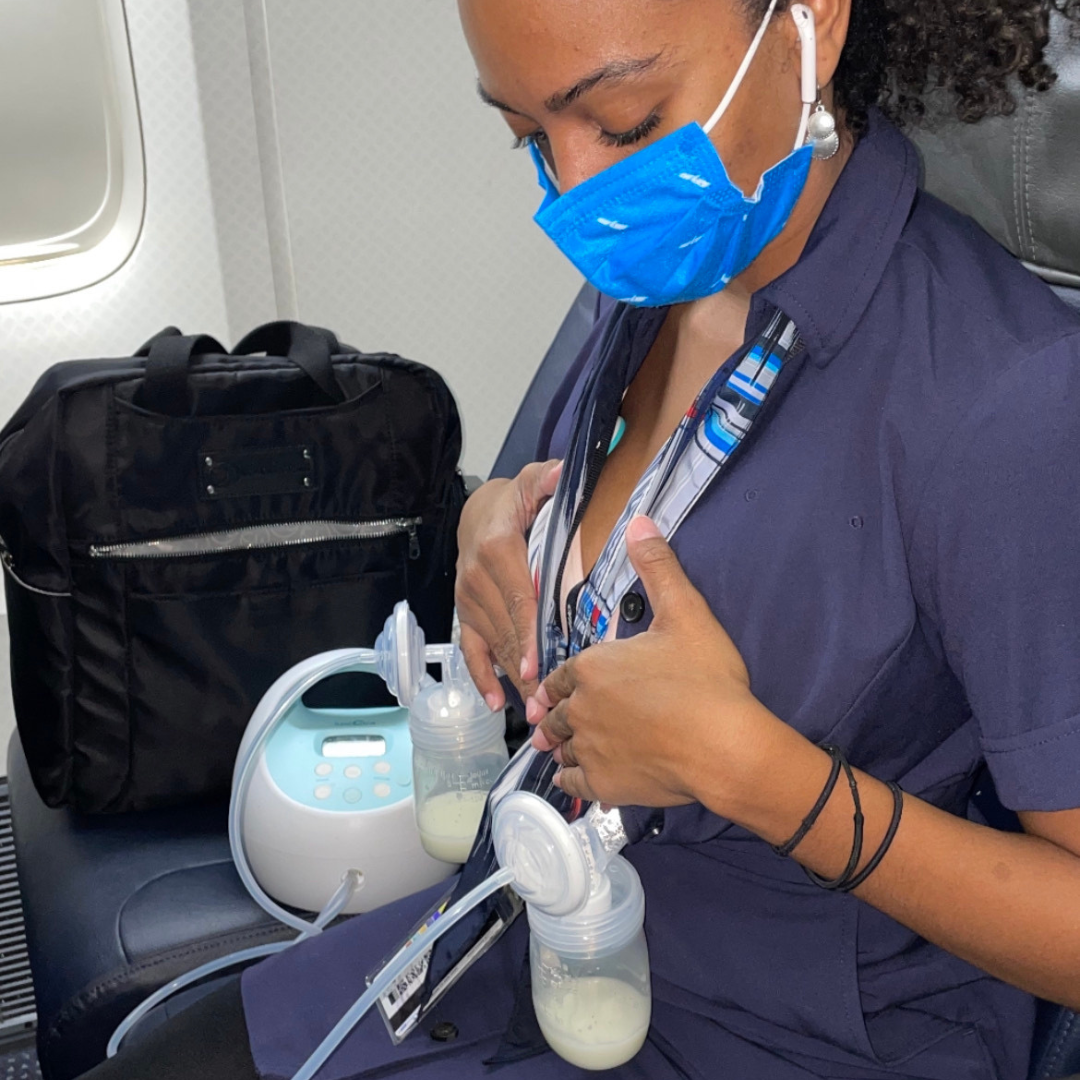In December 2022, The PUMP (Providing Urgent Maternal Protections for Nursing Mothers) Act passed in Congress, marking a significant milestone for breastfeeding parents in the workplace. However, the Act specifically excluded some transportation workers, including delayed implementation of the law for rail crew and total exclusion of airline crews, leaving a crucial gap in protections. Recently introduced legislation, The AIR PUMP Act, aims to close this gap and extend the same protections to airline crews.
The Broader Impact on the Aviation Workforce
The exclusion of flight crews from The PUMP Act not only affects individual employees but also has broader implications for the aviation industry. At a time when airlines are struggling to retain and attract employees, the lack of support for breastfeeding parents can deter potential recruits and push current employees to leave their jobs.
Personal Stories: Alex and Ella's Experiences
Speaking with several Sarah Wells Bags customers, I gathered a variety of perspectives on this topic. Alex*, a pilot for United Airlines, successfully pumped at work under United's existing policies but acknowledges the need for broader protections:
“I pumped at work with my last baby for almost six months, and I’m pregnant with my second child. United has great policies for pumping, and I’ve been able to pump between flights or during non-critical phases of flight. I do want progress and to move forward, but on the other hand I wouldn’t want the legislation to make it so hard for them to accommodate us (e.g., work a normal flight, keep things on schedule) that in actuality it gets harder not easier.
At the end of the day pumping support and how it will play out is probably airline dependent.”
Alex’s story highlights that while some airlines have supportive policies, there remains a need for standardized protections across the industry to ensure all flight crews have the support they need.
Ella*, a flight attendant, also shared her perspective, highlighting the unique challenges faced by airline crews:
“There really is no feasible way to make a private space on an airplane, even the spaces that we have now that you can make private people still come into. Our employer gives us a full year off work after the birth of our child, and it's called bonding leave. In Massachusetts, I was entitled to various paid leave options, which allowed me to stay home for a full year. Once I came back to work, I continued to pump, often using a wearable pump while working. The reality of an airplane is that we don't have any privacy unless we can be behind a locked door. Even then, when we go in and out of our rest areas, everyone is asking where we're going and what we're doing. The unpredictability of flight schedules, delays, and onboard issues makes it difficult to have scheduled breaks for pumping. While I appreciate the idea behind this legislation, I think that what we currently have [paid leave] is more beneficial for moms.”
Standardizing anything in the airline industry is inherently challenging due to the varied and changeable nature of air travel. Anyone who has flown can attest to how each flight can differ significantly based on weather delays, security issues, overbooked planes, passenger challenges, and more. Ella highlights the critical point that airline crews may always face challenges when it comes to pumping, necessitating a flexible and empathetic response from their fellow crew members, employers and passengers. She also underscores the importance of adequate paid leave as a crucial solution for supporting airline crew members who want to breastfeed.
Key Provisions of the AIR PUMP Act
The AIR PUMP Act includes several critical provisions designed to accommodate the unique environment of airline crews:
-
Reasonable Break Time: Air carriers must provide reasonable break time for flight crews to express breast milk for one year after the child’s birth.
-
Appropriate Space: Airlines must provide a space, other than a bathroom, that is shielded from view and free from intrusion, with certain limitations to ensure safety and security.
-
Safety and Cost Considerations: Compliance with the break requirement must not impact flight safety or incur significant expenses, such as adding crew members or modifying aircraft, beyond adding a curtain or screen.
-
Enforcement: The Secretary (Department) of Labor will enforce the AIR PUMP Act in the same manner as the PUMP Act of 2022.
Legislation a Critical Step -- But It's Going to Take ALL Of Us
It is critically important to implement pumping protection and anti-retaliation efforts as outlined in the AIR PUMP Act -- please consider reaching out to your legislator about this issue using the link below. Further, we have learned by asking moms in the industry what they want and need that comprehensive support measures are essential both on the plane and through adequate paid leave. Additionally, fostering a passenger culture that respects crew members and their own personal needs onboard is crucial. It's going to take an effort from all of us who participate in air travel to realize a workplace of pumping support.
Check out these recent news articles and efforts to make a difference on this topic:
You can take action to support The AIR Pump Act
The AIR PUMP Act (legislative fact sheet)S. 1722: AIR PUMP Act
PUMP Act Protections for Transportation Workers
... and don't forget to pre-order your copy of Sarah's forthcoming book, Go Ask Your Mothers: One Simple Step for Managers to Support Working Moms for Team Success!
* It's my practice to change the names of mamas who submit their stories to ensure this remains a safe space to share, thanks!



1 comment
Interesting read. I had no idea that pumping on the job still isn’t allowed for some people. It’s crazy to me that we live in such a developed country but not everyone has the freedom to pump for their babies and most don’tget more than 12 weeks maternity leave.